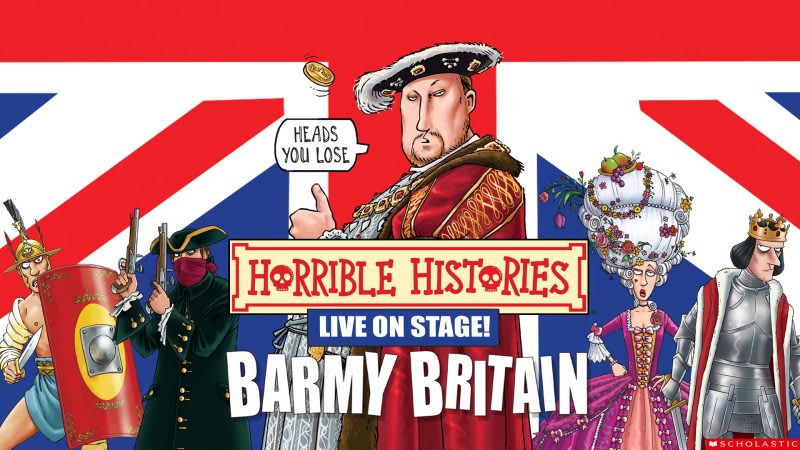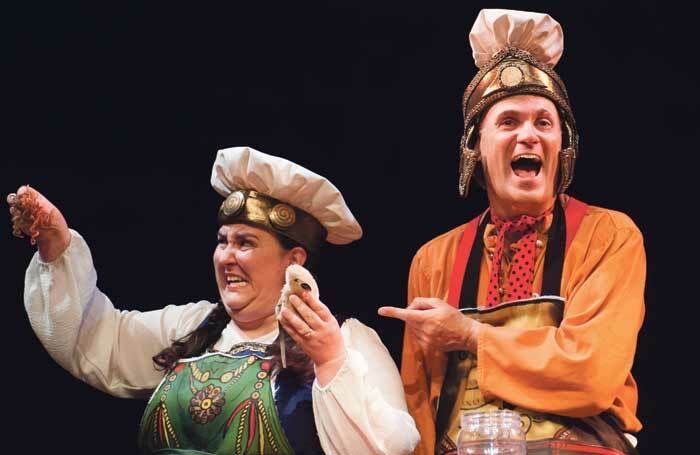Horrible Histories: Theatre During A Pandemic

For as long as I can remember I’ve loved the theatre as much as I’ve loved history. From my days in youth theatre to the countless hours I’ve spent in auditoriums watching different shows, theatre has always been one of my favourite things. And then there’s the 13 years I spent working backstage at Les Miserables in the West End where I ironed more shirts than I want to think about (it was a lot!) and made friendships that I’ll carry with me forever.
When theatres were closed in March to limit the spread of COVID-19, I don’t think anybody really realised that they wouldn’t spring back to life as soon possible. However, almost four months later, with news of widespread redundancies, the closure of the Nuffield Southampton Theatres, and the threat of the closure of countless others, there is a very dark cloud over this vital creative industry and those who are a part of it. (Update: Chancellor of the Exchequer, Rishi Sunak, announced a £1.57bn rescue package for the arts just after I originally posted this blog. It has not yet been decided how this money will be distributed but it will support museums, galleries, music venues and theatres.)
At present it is impossible to predict when rehearsals might be able to restart, when costume fittings and sound checks will be able to take place, or when audiences will be able to pack themselves back into theatre stalls to watch live productions of plays, musicals, and pantos.
However, there is still a chance for us to see live theatre this summer even though the theatres are closed.
Horrible Histories: Live on Stage is based on the best-selling books written by Terry Deary and first launched in 2005 with the world premieres of Terrible Tudors & Vile Victorians. Since then Birmingham Stage Company has produced eighteen different Horrible shows, performing to over three million people in the UK, including the longest running children’s show in West End history, with its record-breaking series Barmy Britain. The show has also reached audiences in Hong Kong, Singapore, Dubai, Qatar, Oman, Abu Dhabi, Bahrain, New Zealand and Australia, where it performed in the Concert Hall of the Sydney Opera House.
The show’s hilarious and informative brand of history education would normally spend the summer in residence at a West End theatre but the closure of theatres has made that impossible this year. However, instead of closing down, the show has relocated…to car parks.
That’s right, instead of theatres, Horrible Histories has been transformed into a drive-in show for audience members to watch from the comfort of their own cars. The tour begins on 11 July and tickets are selling fast. You can book your tickets through Birmingham Stage Company’s website here.
I have been really lucky to chat to Neal Foster, star of Horrible Histories – Barmy Britain and the man behind Birmingham Stage Company, about this year’s show. We discussed the importance of children’s theatre, how the show teaches history so brilliantly, what to expect from the drive-in theatre experience, and how he’s managing to continue to bring live theatre to audiences during a pandemic.



Q: Neal, Horrible Histories needs no introduction and the live stage shows have been touring Britain since 2005. What can we expect from this year’s production?
Neal: Our production of Barmy Britain – Part Five has now been postponed to 2021 and features William the Conqueror doing a rap, Henry VIII house hunting and even Queen Elizabeth II! So this year we’re presenting the best of Barmy Britain which features our favourite scenes from the first three Barmy shows including Queen Boudicca taking on the Romans, Guy Fawkes appearing on Who Wants to Blow Up Parliament and Dick Turpin in The Only Way is Essex. It’s huge fun and we can’t wait to storm the car parks!
Q: You founded The Birmingham Stage Company back in 1992 and it has become a world leading producer of theatre for children and families. I remember seeing your production of George’s Marvellous Medicine during my very first year of study at the University of Birmingham and being struck by the energy of the production. The young audience members were utterly enthralled by the show. Why do you think theatre experiences are important for children?
Neal: We’ve increasingly living in a virtual world that has only got more intense due to the current crisis. So allowing children to experience live theatre is a wonderful way of letting them connect with actors and fellow audience members to create a memorable live experience. It opens their eyes to all sorts of possibilities and lets them directly experience characters and situations that reflect their own lives and bring them into new worlds. Theatre has a way of enlarging our lives and children need that experience to encourage their imaginations and their personal growth.
Q: Horrible Histories, in its various forms, has been teaching children (and adults) about the past for almost 30 years. They have inspired an entire generation of history lovers and that shows no sign of stopping anytime soon. What is it about them, and particularly the stage version, that makes them such a great way to learn history?
Neal: The beauty of Horrible Histories is you can convey a huge amount of information in a very short space of time by setting it in a humorous situation. When I put General Haig in front of Lord Sugar to discuss why the Battle of the Somme hadn’t been the successful task Sugar had ordered, we conveyed an enormous number of facts about the First World War in a way that made it funny and appalling. Whenever people laugh, it means they understand, so if you can make people laugh about a situation, they’ve usually absorbed what you’re trying to illustrate and it becomes more memorable. Laughter is an underrated means of teaching.
Q: The effect of COVID-19 on the theatre industry in the UK has been devastating. This show would usually spend the summer in a West End theatre but that has become impossible this year. Turning Horrible Histories into a drive-in experience is nothing short of genius. How did the idea come about?
Neal: We were approached by the Coalition Agency which is a talent agency who have created amazing car park events to break through Covid. It’s a wonderfully safe way of experiencing live theatre and we can’t wait for our first performance in Henley. In the last few weeks we’ve been approached by half a dozen more promoters, so you’ll see us popping up all over the country, including north London.
Q: How have you adapted to show to take advantage of the new ‘theatre’ environment and what would you say to a potential audience member who thinks that the experience of watching from the car is too different from sitting in a theatre?
Neal: We haven’t had to change much about the show except add lots of lockdown jokes which suit the production very well! The show will still be very interactive, so our audience will be flashing their lights and blowing their horns! Theatre is always a special event but this time it will be completely different to anything people have experienced before and we hope to make it a truly marvellous hour of entertainment.
Q: As well as being the man behind The Birmingham Stage Company, you’re a very experienced actor and you are one of two cast members in the Barmy Britain show. I’m really interested in how you and your co-star, Morgan Philpott, are managing socially distanced performing?
Neal: We decided to bring each other into our bubble so we can interact normally. It means we can present the show exactly as we perform it in the West End, so it will be same experience for the audience.
Q: Since you announced your drive-in shows, Six The Musical has followed in your footsteps and is also inviting audiences to see their live show in the open air. I’m struck by how whole new audiences might find this experience more accessible or discover productions that they might not normally see. Do you think drive-in shows will have a life after theatres have reopened?
Neal: The big thing against car park theatre is that it is very expensive to stage. There are so many different aspects which need professional expertise – attendants, security, specialised technicians – that it probably isn’t a long-term solution to the situation.
Q: And finally, which is your favourite Horrible Histories sketch or character to perform and is there a particular period or person that you really want to put into a show but haven’t yet?
Neal: I always like dressing up as a Roman solider – they had a cool outfit! – but my favourite character is William Burke, who with his friend William Hare murdered sixteen people in Edinburgh so they could sell the dead bodies to surgeons. It must have been fun while it lasted but they were thankfully caught after a year and after he was hanged, parts of Burke’s skin were made into gift boxes which occasionally still come up for sale! When the time comes, it would be fun to include Boris Johnson!
Neal, thank you so much for taking the time to talk to me. I can’t wait to see the show!
Tickets for Horrible Histories: Barmy Britain are available here.